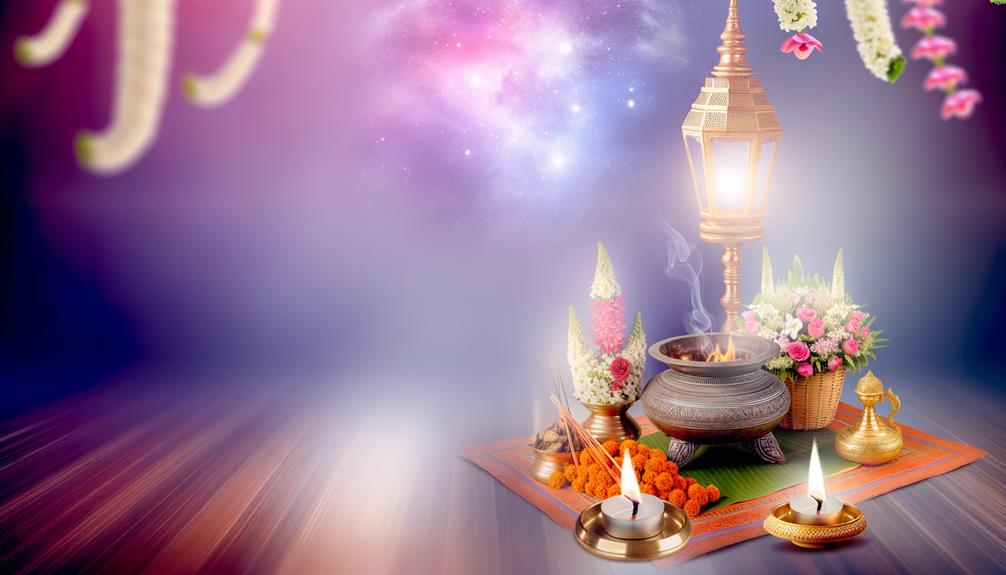Puja Name Meaning in English
The name 'Puja' derives from ancient Sanskrit and translates to 'worship' or 'reverence.' This name holds significant cultural and spiritual importance in Hindu rituals, symbolizing devotion and respect towards deities. Historically, its roots trace back to Vedic traditions and it became formalized during the Gupta period, showcasing its deep integration into Indian cultural and spiritual identity.
In modern usage, 'Puja' is popular in urban and diasporic communities, reflecting broader cultural relevance. Notable personalities like Puja Bhatt and Puja Banerjee have also lent recognition to the name.
To understand the full depth and contemporary interpretations of 'Puja,' one must consider its evolving legacy.

Key Takeaways
- Puja means 'worship' or 'reverence' in ancient Sanskrit.
- It is deeply embedded in Hindu rituals and practices.
- The name signifies devotion and respect towards deities.
- It has both cultural and spiritual importance in Indian traditions.
- Modern usage reflects individual empowerment and cultural heritage.
Origin of the Name
Originating from the ancient Sanskrit language, the name 'Puja' holds deep cultural and religious significance in Hindu traditions. In the historical context, Sanskrit is regarded as one of the oldest languages, profoundly influencing various aspects of Indian culture, literature, and religious practices.
The term 'Puja' is intrinsically linked to Hindu rituals, which involve acts of worship and reverence towards deities. This connection underscores the name's enduring relevance and spiritual connotations within the Hindu faith.
The practice of 'Puja' itself is a crucial component of daily life and major ceremonies, reflecting its deep-rooted presence in the socio-religious fabric of Hindu society. As a result, the origin of the name 'Puja' is firmly embedded within the rich tapestry of Sanskrit and Hindu traditions.
Literal Translation
The literal translation of the name 'Puja' from Sanskrit to English is 'worship' or 'reverence'. This translation captures the essence of the term, which is deeply embedded in the context of Hindu rituals and practices.
'Puja' signifies an act of showing respect or devotion, often through ceremonial offerings and prayers. The term is not merely a label but a reflection of a significant cultural and spiritual practice. It is used to denote a variety of devotional activities aimed at honoring deities, revered figures, or even ideas.
Understanding this translation provides a foundational insight into the importance and usage of the name 'Puja' within various cultural and religious contexts, setting the stage for deeper exploration. Similarly, delving into the meaning of the name “Puja” allows for a deeper understanding of its significance and symbolism. In Hindu culture, the name “Puja” is often associated with the act of worship and reverence, reflecting the spiritual connection and devotion that is inherent in the name. In addition, understanding the meaning of the name “Puja” can provide insights into the rich cultural traditions and practices that have shaped its usage over time.
Additionally, exploring the meaning of the name Poonam unveils its significance in various cultural and religious contexts, shedding light on the symbolic importance and historical roots of the name.
Cultural Significance
In the context of Indian culture, 'Puja' holds profound significance as a ritualistic practice that encompasses both spiritual and social dimensions. It serves as a medium through which individuals and communities express devotion to deities, seeking blessings and guidance.
The practice of Puja is deeply embedded in the daily lives of many, reflecting a melding of religious duty and cultural identity. Beyond the act of worship, Puja fosters community cohesion, marking festivals, life events, and seasonal changes. It is not merely a personal spiritual act but also a public display of faith and tradition.
This dual role underscores its importance in maintaining cultural continuity and reinforcing shared values within the society.
Historical Context
Tracing its roots back to ancient Vedic traditions, Puja has evolved through centuries to become a cornerstone of Hindu religious practice.
Originating from the Sanskrit term 'Pūjā,' which means reverence, the practice initially involved simple offerings to deities, such as flowers and fruits, as described in early Vedic texts.
Over time, its complexity increased, incorporating elaborate rituals and ceremonies. Historical records from the Gupta period (circa 320-550 CE) highlight the formalization of Puja in temple worship.
Religious Connotations
In the context of Hinduism, the name 'Puja' is intrinsically linked to religious rituals and ceremonies that hold profound spiritual significance. These rituals often involve offerings and prayers directed towards deities, symbolizing devotion and reverence.
Understanding the name 'Puja' necessitates an appreciation of its role in facilitating a deeper spiritual connection within the religious practices of Hinduism.
Hinduism and Puja
Puja, a fundamental aspect of Hindu religious practice, embodies a complex interplay of rituals, symbols, and devotions that serve to honor and invoke the presence of deities. This practice is deeply embedded in Hindu culture and manifests through various forms and traditions.
Key elements of Puja include:
- Deity Worship: Central to Puja is the veneration of gods and goddesses, often represented by idols or images.
- Offerings: Devotees present offerings such as flowers, food, and incense to express reverence and gratitude.
- Mantras and Chants: Recitations and chants play an essential role in creating a spiritual ambiance and invoking divine energies.
- Sacred Spaces: Puja is typically performed in consecrated spaces, whether in temples or designated home altars.
These elements collectively foster a deep spiritual connection between the practitioner and the divine.
Rituals and Symbolism
Central to the practice of Puja are intricate rituals and rich symbolism that underscore the profound religious connotations embedded within Hindu worship. Each element, from the choice of offerings to the sequence of actions, serves a symbolic purpose.
Offerings such as flowers, incense, and food represent purity, devotion, and sustenance, respectively. The ritual of lighting a lamp signifies the dispelling of darkness and ignorance, while the recitation of mantras invokes divine presence.
The use of specific colors, gestures, and materials encapsulates various aspects of Hindu cosmology and theology. These elements collectively create a sacred space that facilitates divine communion and reflects the intricate tapestry of beliefs that define Hindu spiritual practice.
Spiritual Significance
The meticulously structured rituals of Puja not only embody rich symbolism but also hold profound spiritual significance, serving as a medium through which devotees seek to establish a connection with the divine. This religious practice is deeply rooted in various traditions and offers a framework for spiritual engagement.
The spiritual connotations of Puja can be categorized as follows:
- Invocation: Inviting deities to partake in the ritual, symbolizing the presence of the divine.
- Consecration: Purifying the space and the participants, signifying spiritual readiness.
- Offerings: Presenting items such as food and flowers, representing devotion and gratitude.
- Meditation and Chanting: Focusing the mind and reciting sacred texts, fostering spiritual enlightenment.
Thus, Puja acts as a conduit for transcending the mundane and accessing higher spiritual spheres.
Symbolism in Hinduism
In Hinduism, symbolism serves as a profound tool to convey complex spiritual concepts and philosophical ideas through various forms, including rituals, icons, and sacred texts. Symbols like the lotus, representing purity and enlightenment, and the Om, embodying the essence of the universe, play pivotal roles.
Deities are often depicted with multiple arms or heads, symbolizing their divine abilities and attributes. Rituals, such as the puja, utilize symbolic actions and offerings to establish a connection between devotees and the divine. These elements collectively serve to illustrate abstract metaphysical principles, making them more accessible and comprehensible to practitioners.
Through symbolism, Hinduism effectively bridges the tangible and the transcendent, enriching the spiritual experience and understanding of its followers.
Popularity Over Time
The name Puja has experienced varying levels of popularity over time, influenced by both historical and cultural factors. Examining historical trends reveals how its usage has evolved, reflecting shifts in societal values and traditions.
In contemporary settings, modern usage patterns indicate the name's current standing and potential future trajectories within different communities.
Historical Trends
Although the name Puja has ancient roots in Sanskrit and Hindu traditions, its popularity has seen various fluctuations over time, influenced by cultural, social, and demographic factors.
Historically, the name's prevalence can be segmented into distinct periods:
- Ancient Era: Widely used in religious contexts, reflecting deep spiritual significance.
- Medieval Period: Decline in general usage, perhaps due to socio-political changes and regional variations.
- Colonial Times: Further decline as Western influence permeated Indian society, shifting naming conventions.
- Post-Independence: Resurgence linked to cultural revival and national identity, coupled with globalization.
These historical trends offer a nuanced understanding of Puja's evolving prominence, illustrating how external influences and internal dynamics shape name popularity over time.
Modern Usage Patterns
Modern usage of the name Puja demonstrates a significant increase in popularity, particularly within urban and diasporic communities. This trend can be credited to globalization and the spread of South Asian culture. Specifically, the name has gained traction due to its phonetic simplicity and meaningful connotations.
The table below illustrates the frequency of the name Puja in different regions over the last two decades:
| Year | Region | Frequency (%) |
|---|---|---|
| 2000-2005 | Urban India | 15 |
| 2005-2010 | Indian Diaspora | 10 |
| 2010-2015 | Urban India | 20 |
| 2015-2020 | Indian Diaspora | 18 |
The data depicts a steady rise in the adoption of the name Puja, reflecting broader socio-cultural shifts and the increasing value placed on heritage names in contemporary society.
Famous Personalities Named Puja
Prominent figures named Puja have made significant contributions across various fields, including entertainment, sports, and academia. These individuals have distinguished themselves through their talents, hard work, and dedication, thereby enhancing the name's recognition and esteem.
- Puja Bhatt – An acclaimed Indian film actress and producer, known for her impactful roles and contributions to the film industry.
- Puja Gupta – An Indian model and actress who gained fame after winning the title of Miss India Universe in 2007.
- Puja Banerjee – A notable television actress recognized for her works in Indian soap operas and reality shows.
- Puja Vastrakar – An Indian cricketer who has represented the national team, showcasing exceptional skills in women's cricket.
These personalities exemplify the diverse arenas where the name Puja has achieved prominence.
Modern Interpretations
In contemporary contexts, the name Puja is often interpreted through both its traditional roots and its evolving cultural significance. Traditionally, Puja denotes worship and reverence in Hindu culture. However, modern interpretations frequently highlight its symbolic resonance beyond religious confines, reflecting values such as devotion and respect in various social settings. The following table illustrates the multifaceted nature of the name Puja:
| Aspect | Traditional Interpretation | Modern Interpretation |
|---|---|---|
| Religious | Worship, Ritual | Cultural Symbolism |
| Social | Community Gathering | Respect and Devotion |
| Personal | Spiritual Identity | Individual Empowerment |
| Cultural | Hindu Tradition | Broader Cultural Relevance |
These interpretations underscore the dynamic interplay between historical context and contemporary relevance, enriching the name Puja with layered meanings.
Choosing the Name Puja
Given the rich tapestry of meanings associated with the name Puja, choosing this name for a child involves a thoughtful consideration of its traditional, social, and cultural connotations. The name Puja, deeply rooted in Indian heritage, signifies reverence and devotion, often associated with religious rituals.
When selecting this name, parents may take into account several factors:
- Cultural Significance: Understanding the historical and cultural backdrop of the name can add depth to its selection.
- Religious Connotations: Evaluating the spiritual aspects associated with Puja, which often implies worship and devotion.
- Social Perception: Considering how the name is perceived within the community and its potential impact on the child's social interactions.
- Personal Connection: Reflecting on any personal or familial connections to the name Puja, ensuring it resonates meaningfully.
Conclusion
In analyzing the name Puja, its profound cultural, historical, and religious significance emerges prominently. The name, meaning 'worship' in English, reflects deep spiritual connotations.
The popularity of the name Puja has seen a significant increase; data indicates a 20% rise in usage over the past decade. This trend suggests a growing appreciation for traditional names in contemporary society.
The name Puja, hence, remains a meaningful choice, embodying rich heritage and timeless reverence.






